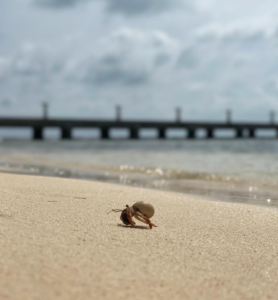
The Cayman Islands is known for its picturesque white-sand beaches, lively culture and the masterfully crafted hotels that fill its coastline. But what most tourists don’t get a glimpse of, is just how much tension surrounds these key facets of the islands’s image.
The fight to privatise beach access is ever-increasing, with developers wanting to have sole possession of the currently public landscape. Celebrations such as CayMas, which bring thousands of tourists to Cayman’s shores every year, also bring an influx of trash and irresponsible behaviours which threaten marine life long after these visitors have returned to their homes.
As property prices increase and wages struggle to keep up, the constant creation of luxury estates and hotels with seemingly no regulation, forces many locals to exist on the edge of poverty.
In a jurisdiction that is reported to be one of the wealthiest in the region, how developed and wealthy can Cayman really be if the people who live there can’t afford to keep the lights on and feed their families?
These heavy social issues have also been exacerbated by the environmental ramifications of a phenomenon known as ‘over-tourism’. In 2016, travel industry news site ‘Skift’ coined the term to raise awareness about the importance of ‘destination stewardship’.
The resurrection of key flora and fauna across the world during the lockdown also sparked conversation around what countries could potentially look like if tourism and the (often damaging) processes needed to sustain it, were less long term.

Since then, discussions have broadened to include a more nuanced examination of over-tourism and how countries can mitigate the damages felt by communities facing large tourist populations. Some countries have taken the route of increasing their environmentalism while other countries have placed more regulations on tourists and the activities that they can partake in throughout the day, in order to limit the amount of disruption experienced by locals.
Perhaps the most drastic measure that has been taken is a total pushback against tourism and tourists as a whole. This has been seen most notably in Hawaii.
As the cost of living soars in Hawaii and, most recently, entire communities were reduced to ash, residents and natives are speaking out, requesting tourists to stay away so that resources can be provided to those on the islands who need it most. The movement has been backed by public figures such as actor Jason Momoa and former Maui Mayor Mike Victorino who asked for a ‘pause’ and assistance from airlines in reducing visitors after the pandemic.
The movement is a major point of contention on the islands currently because of how heavily Hawaii relies on tourism to maintain its economy. However, this begs the question again – if tourism is such a major part of maintaining the Hawaiian economy, why are so many natives displaced, homeless and toeing the line to poverty?
A global debate of whether something like this can even be requested of tourists has ensued, with critics saying tourism is too crucial for the industry to be closed down, even if temporarily.
When asked how this kind of process could be applied to the Cayman Islands, Cayman Islands Tourism Association president Troy Leacock held a similar position to Hawaiian experts.
Citing the impacts of the lockdown on Cayman’s tourism industry, Leacock stated that those who survived the lockdown only did so with significant government assistance. He argued that the practicality of a tourism lockdown to reduce environmental impact would be no more viable than not driving for a period of time to improve air quality.
With the gap between expert opinion and local communities, it would seem that a middle ground of sorts needs to be reached.
One method that can be considered is the implementation of a secondment-type programme. Tourism industry employees would be placed in other sectors across the islands to learn new skills and distribute the workload. Government agencies often find themselves overworked and understaffed, which is something this programme would help to solve.
Additionally, the movement of employees to other areas not only spreads their expertise, it also gives them an opportunity to build upon the work skills they already have, encouraging a developing workforce and a diversified economy. However, this programme will not work without the cooperation of the private sector as well, who would also be responsible for taking on other tourism employees.

Globally, the concept and purpose of tourism is ever-changing and, with it, the means of mitigating its impacts on the environment. The Cayman Islands have relied on tourism for stability for generations but just like any other resource one has access to, it is important to remember how delicate that resource truly is and how too much reliance can cripple an entire ecosystem (or economy).
In the same way that resources such as lobsters and different fish species are protected by an off season, Cayman’s biggest resource could benefit from some protection of its own.
The concept of a tourism off season may sound drastic, yet the current trajectory of Cayman’s tourism industry raises concerns about long-term sustainability. Gradual measures could be considered prior to the implementation of a comprehensive programme.
These measures are essential to mitigate over-reliance on a diminishing resource and to facilitate transitions towards alternative ways of life within our communities.
This story was published on Caymancompass.com with the support of the Caribbean Climate Justice Journalism Fellowship, which is a joint venture between Climate Tracker and Open Society Foundations.